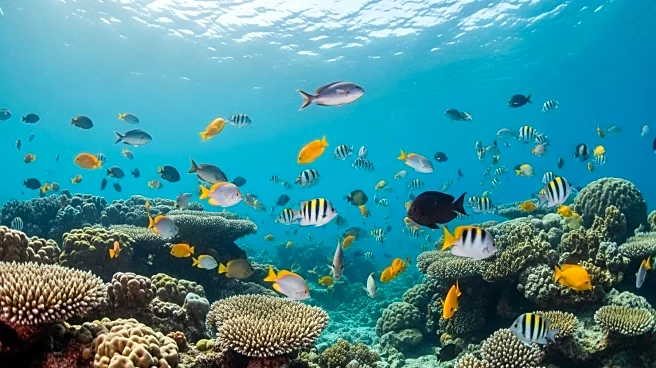What's Happening?
An Oceana report has highlighted the critical state of the UK's top ten commercial fish stocks, including North Sea cod and herring, which are either critically low or overexploited. The report criticizes the UK government's failure to adhere to scientific advice on catch limits, which has led to the depletion of fish populations. Oceana urges the government to implement a strategy to end overfishing, including setting legally binding deadlines and catch limits to rebuild fish populations. The report notes that only 41% of assessed stocks are healthy, while 27% are critically depleted and 25% are overexploited. The International Council for the Exploration of the Sea has recommended a zero-catch limit for North Sea cod to prevent further declines. Despite this, UK ministers have set catch quotas above sustainable levels, threatening fish populations and coastal livelihoods.
Why It's Important?
The depletion of fish stocks poses a significant threat to the UK's fishing industry and coastal communities that rely on these resources for their livelihoods. Overfishing can lead to the collapse of fish populations, which would have severe economic and environmental consequences. The report emphasizes the need for the UK government to align catch limits with scientific advice to ensure the long-term sustainability of fish stocks. Failure to address overfishing could result in a loss of biodiversity and the degradation of marine ecosystems, impacting food security and the economy. The government's commitment to restoring stocks to sustainable levels is crucial for the future of the fishing industry and the health of marine environments.
What's Next?
Oceana calls for the UK government to work with devolved administrations to urgently develop a strategy to end overfishing by 2026. This includes establishing a legally binding deadline to restore fish stocks and aligning all catch limits with scientific advice by the end of 2025. The organization also advocates for a fair deal for fishermen transitioning to lower catch limits and sustainable practices. The government has launched a £360m Fisheries and Coastal Growth Fund to support the industry and promote sustainable management of stocks. Continued collaboration with the fishing industry and adherence to scientific recommendations will be essential in achieving these goals.
Beyond the Headlines
The report highlights the ethical and political dimensions of overfishing, emphasizing that it is a political choice rather than an unavoidable tragedy. The UK government's decisions on catch limits have long-term implications for marine conservation and the prosperity of coastal communities. Addressing overfishing requires a commitment to science-based policies and accountability to ensure the recovery of fish populations and the sustainability of the fishing industry.








